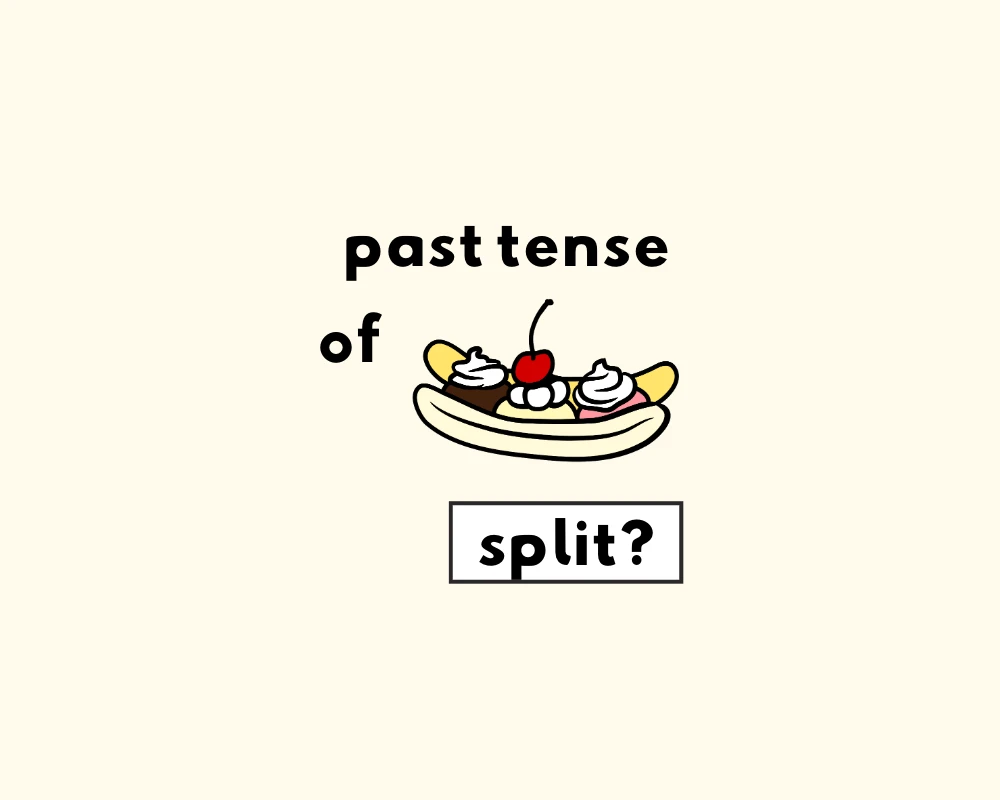
Contents
Toggle
Split vs. splitted: what’s the past tense of split?
Did you split the pieces in half, or were they splitted in half? If the answer to this question on verb conjugation evades you, you needn’t worry because the answer is below.
Verb forms of split
The irregular verb split, as defined by Collins Dictionary, is understood as “if something splits or if you split it, it is divided into two or more parts.”
- Split is an irregular verb that does not end in -“ed” in its past verb forms.
- Split remains the same in the present tense, past tense and past participle form, i.e., all are split.
| present | past | future | |
| simple | I split | I split | I will split |
| continuous | I am splitting | I was splitting | I will be splitting |
| perfect | I have split | I had split | I will have split |
| perfect continuous | I have been splitting | I had been splitting | I will have been splitting |
1. Split is in the present tense: If the nail you use is too big, there’s a chance that the wood will split.
2. Split is the simple past: She split the class into groups of four.
3. Split is also the past participle: He had split his trousers when he bent over.
4. Splits is the third person singular present: Slate splits easily into thin sheets.
Past tense vs. Past participle of split:
1. The results split neatly into two groups. (past simple)
2. She had split the difference between them before leaving for the night. (past participle)
We can distinguish between the simple past tense and the past perfect/continuous tenses by the presence of any auxiliary verbs in the same sentence, such as have/had (in the present perfect and past perfect tenses, respectively). The second sentence includes had + split, which creates the past perfect tense. We write in the past perfect tense when we want to stress the correct sequence in which past events or actions took place.
Verbs with one form in the present and past
| base verb | past tense | past participle |
| split | split | split |
| burst | burst | burst |
| bet | bet | bet |
| shut | shut | sunk |
| hit | hit | hit |
| set | set | set |
Examples of split in present tense
1. If the chicken is fairly small, you may simply split it in half.
2. The Kremlin is deeply split in its approach to foreign policy.
3. Identical twins come from a single fertilized egg that splits in two.
4. His time is split between the London and Paris offices.
Examples of split in the past tense
1. In a severe gale the ship split in two.
2. The two men agreed to split the proceeds.
3. The sect split from the Mormon church more than a hundred years ago.
4. The poll found the public evenly split on the issue.
5. The cushion split open and sent feathers everywhere.
Examples sentences of split as a participle
1. Her dress had split along the seam.
2. The country was split down the middle over the strike.
3. The weight of the coal had caused the sack to split.
Synonyms of split
- divide
- break
- fracture
Idioms with split
| phrase | meaning |
| make like a banana and split | to get out of somewhere quickly |
| in a split-second or lickety-split | (it will take a second, figuratively speaking) |
| finer than a frog’s hair split four ways! | a hilarious way of saying you’re doing great or fine |
| don’t let the door hit you where the good Lord split you! | a way to say ‘leave’ quickly |
| split between two things | can’t decide between people or situations |
Origin of the word split
From etymology online on split (v.):
1580s (transitive and intransitive), not found in Middle English, probably from a Low German source such as Middle Dutch splitten, from Proto-Germanic *spleitanan.
Other commonly confused verb tenses
- What’s the past tense of spread?
- What’s the past tense of lead?
- What’s the past tense of choose?
- What’s the past tense of fly?
- What’s the past tense of lay?
- What’s the past tense of drive?
- What’s the past tense of draw?
Learn more about verbs
- What are regular and irregular verbs?
- Transitive and intransitive verbs?
- What are verbs?
- What’re personal pronouns?
- What’s the difference between they’re, their, and there?
- Whose vs who’s?
Sources
- Most material © 2005, 1997, 1991 by Penguin Random House LLC. Modified entries © 2019 by Penguin Random House LLC and HarperCollins Publishers Ltd
- Harper, Douglas. “Etymology of split.” Online Etymology Dictionary, https://www.etymonline.com/word/split. Accessed 28 February, 2023.










